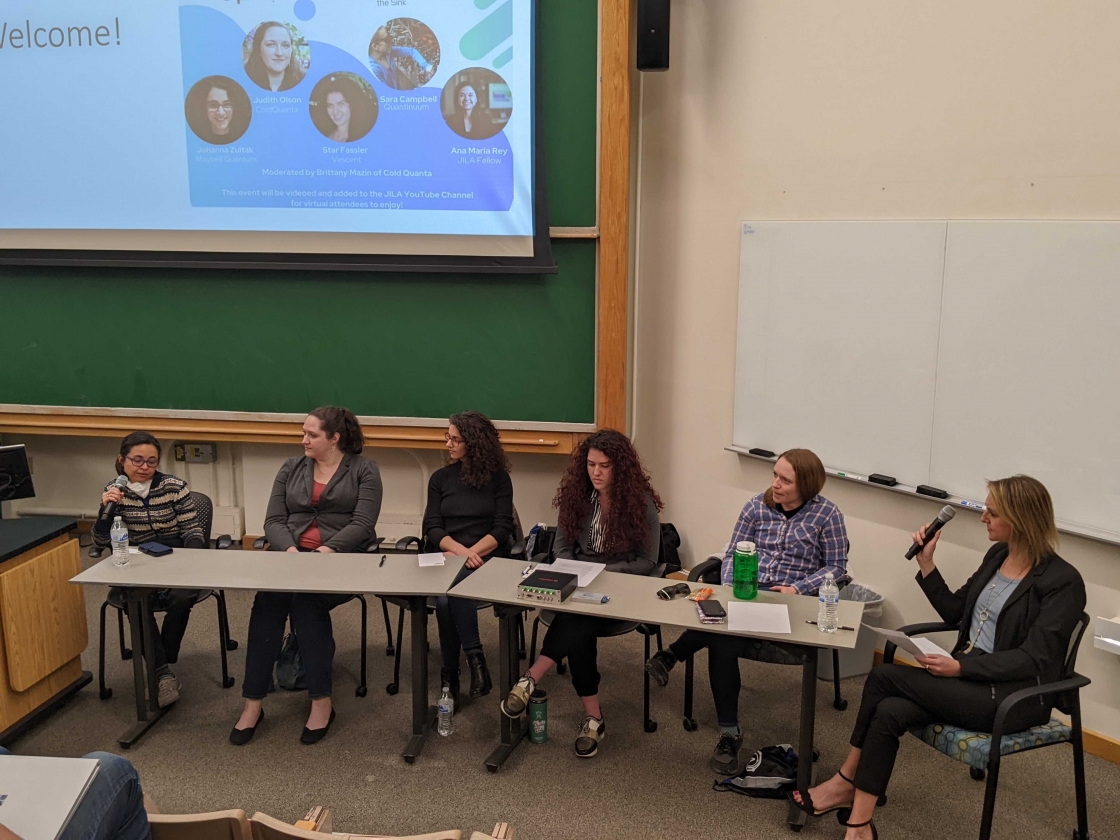Colorado has a reputation for being a quantum ecosystem hotspot and a recent panel discussion further bolstered this image. It was hosted by JILA, a world-leading physics institute created by a partnership between the University of Colorado Boulder and NIST; and the CUbit Quantum Initiative, a CU Boulder research center. The panel, titled "Women in Quantum: What Does It Take," brought in individuals from both quantum research and the quantum industry. With panelists from some of the biggest names in the quantum industry, including ColdQuanta, Maybell Quantum, Quantinuum, and Vescent, the discussions about the industry itself were relevant and engaging.
The panelists ranged in ages and positions, from engineers to researchers. The panelists included Judith Olson (ColdQuanta), Ana Maria Rey (JILA), Sara Campbell (Quantinuum), Star Fassler (Vescent), and Dr. Johanna Zultak (Maybell Quantum). During the discussion, the panelists spoke about their backgrounds and day-to-day activities. “I work with a lot of fibers,” said Fassler, who highlighted the common debugging issues with quantum, as things often went wrong. She joked: “so I need to walk away when I get upset, or else I’ll break the fibers. It’s good to learn to walk away when you need to.”
While all of the panelists had backgrounds in research, they all followed different paths to get to their current positions. As women within both academia and industry, all had experienced the need for more diversity in a field that has a male majority. “When I was doing my Ph.D., there were no women professors in physics,” Zultak explained. “Now there are a few, so we’ve made a bit of progress.” In discussing how to improve this diversity, each of the speakers offered their own suggestions. “Role models are very important,” highlighted Rey. Olson added to that sentiment, saying that she advocated for other women in her company, making them feel welcome, and wanted to encourage others to do the same. As the quantum industry is still relatively new and growing significantly, many companies are taking this opportunity to make a point to be more inclusive or diverse. For example, ColdQuanta hosted its own panel of women in the quantum industry, showing that key players in the industry are taking this issue very seriously.
While this panel not only helped bring more awareness to the lack of diversity, it also showcased the rich quantum ecosystem within Colorado. CUbit, one of the panel's producers, has worked hard to foster that community by developing a partnership network between CU Boulder and Colorado quantum companies. This partnership allows university students to better network with these companies as well as experience an endless range of career opportunities. Campbell highlighted the importance of JILA as well, giving her time to meet role models and mentors within the industry. With this ecosystem continuing to grow, it will be no surprise that Colorado will continue to remain a global hotspot for both quantum research and quantum technology.
Written by Kenna Castleberry, JILA Science Communicator
You can find the link to the panel video below.



 The Physics Frontiers Centers (PFC) program supports university-based centers and institutes where the collective efforts of a larger group of individuals can enable transformational advances in the most promising research areas. The program is designed to foster major breakthroughs at the intellectual frontiers of physics by providing needed resources such as combinations of talents, skills, disciplines, and/or specialized infrastructure, not usually available to individual investigators or small groups, in an environment in which the collective efforts of the larger group can be shown to be seminal to promoting significant progress in the science and the education of students. PFCs also include creative, substantive activities aimed at enhancing education, broadening participation of traditionally underrepresented groups, and outreach to the scientific community and general public.
The Physics Frontiers Centers (PFC) program supports university-based centers and institutes where the collective efforts of a larger group of individuals can enable transformational advances in the most promising research areas. The program is designed to foster major breakthroughs at the intellectual frontiers of physics by providing needed resources such as combinations of talents, skills, disciplines, and/or specialized infrastructure, not usually available to individual investigators or small groups, in an environment in which the collective efforts of the larger group can be shown to be seminal to promoting significant progress in the science and the education of students. PFCs also include creative, substantive activities aimed at enhancing education, broadening participation of traditionally underrepresented groups, and outreach to the scientific community and general public.